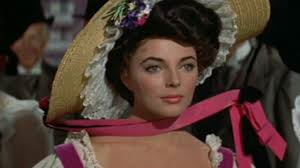 Richard Fleischer directed several worthwhile true crime dramas (The Boston Strangler, 10 Rillington Place) but The Girl in the Red Velvet Swing (1955) isn't one of them. Lavish DeLuxe color, appealing stars and an historical pedigree only partially redeem a tawdry melodrama.
Richard Fleischer directed several worthwhile true crime dramas (The Boston Strangler, 10 Rillington Place) but The Girl in the Red Velvet Swing (1955) isn't one of them. Lavish DeLuxe color, appealing stars and an historical pedigree only partially redeem a tawdry melodrama.Evelyn Nesbit (Joan Collins) works as a model and chorus girl in 1900s New York. She catches the eye of Stanford White (Ray Milland), architect known both for designing Madison Square Garden and proclivities towards showgirls. While they engage in an illicit tryst, Evelyn also wins the attention of Harry K. Thaw (Farley Granger), a Pittsburgh coal magnate with a short temper and erratic personality. Evelyn eventually marries Thaw, but White can't leave well-enough alone.
The Nesbit-Thaw-White triangle, with its lurid backstory, murderous climax and sensational trial has inspired several worthy films, notably Milos Forman's Ragtime (1981). As a '50s production, The Girl in the Red Velvet Swing can only hint at the case's explicit details, which so scandalized 1906 New York. White's boozy parties remain discreetly offstage, while the titular swing is merely a pretty detail. Fleischer's direction relies overmuch on Milton R. Krasner's sumptuous photography to compensate for stilted staging, putting more effort into the musical numbers than its set pieces.
Despite claiming extensive research, including the real Evelyn Nesbit's cooperation, Swing offers rote characterizations: Evelyn the put-upon ingénue, Stanford the aged romantic, Thaw the unstable cad. The movie devolves into a predictable tug-of-war between the two, giving little hint of either man's background. White was an accomplished architect and Thaw an unbalanced rake as obsessed with White as Evelyn, but you'd barely know that from this movie.
Since Fleischer and writers Walter Reisch and Charles Brackett never flesh out their characters, the romance fizzles. Only Evelyn proves convincing, and even then she's too much a plot pawn to earn our respect. After Thaw guns down White, she's manipulated by her husband and his attorney (Luther Adler) into inventing outrageous tales of debauchery to exonerate Thaw. This interpretation's only feasible because Fleischer's so discreet about his stars' indiscretions. If White parties as hard as early scenes imply, it's harder to buy either him or Evelyn as a wronged innocent.
Joan Collins fares best: beautiful and energetic, she convincingly develops from naïve to harried and haughty, then to confused and traumatized. Ray Milland manages to milk some poignancy from his role through gravitas alone, but Farley Granger overplays Thaw's simmering nastiness. Glenda Farrell steals every scene as Evelyn's stuff mother, while Luther Adler enlivens the inevitable trial scenes.
History ordains Swing's denouement but not its flaccid presentation. All the elements of a worthy film lay there, mostly unused in an unremarkable studio production.

